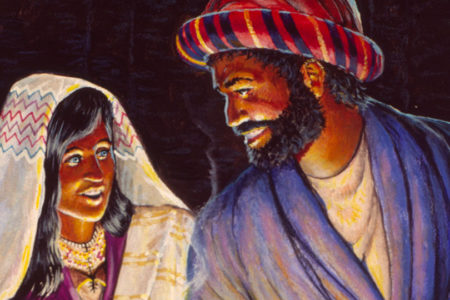God’s Law for Redeeming the Land
One cannot understand fully the story of Ruth and the role of Boaz as the kinsman-redeemer apart from a knowledge of God’s program of land redemption for Israel and the responsibilities of the kinsman-redeemer.
God’s Program Oo Land Redemption for Israel
Several significant principles were involved in God’s land redemption program for Israel.
The Principle that the Land of Israel Belonged to God
This was the first and foremost principle. In Leviticus 25:23 God declared, “the land is mine.” He was its ultimate owner; therefore, ultimate power over the land rested with Him as Israel’s King (Ps. 149:2; Isa. 43:15).1 He alone had the right to rule over and dispense the land for His own benefit and in accordance with His own sovereign purpose.
The Principle of Tenant Possession
God gave His land of Israel to the people of Israel to possess as an inheritance forever: “For all the land which thou seest, to thee will I give it, and to thy seed forever” (Gen. 13:15; cp. 15:7; Dt. 19:14; Josh. 1:2). Even though God gave the land to the people of Israel, they were not to regard themselves as its sole owners and authorities. Because God was the ultimate owner of the land, they were responsible to serve as His representatives, administering His rule over the land for His benefit, in accordance with His sovereign purpose and in obedience to His commands. The Mosaic Law spelled out the details of this arrangement. Scholars have described this principle in various ways. Margolis said, “The land, the law declares, properly belongs to YHWH, who is sole landlord, while all the Israelites are but his tenants.”2
Bess wrote,
The proper concept of this divine ownership appears to be that every Israelite proprietor was to regard his holding as deriving from God himself, as though it had been apportioned to him from God … each head of a family holding his own land as from God.3
Yahweh was king in Israel, and the people conceived of their holdings as fiefs.4
Each family, or perhaps each individual, recognized the suzerainty of Yahweh and acknowledged themselves his vassals. The whole relationship harmonized well with the concept of God as the owner of the land and the people as his feudal tenants.5
God expressed this relationship in the following statement: “For unto me the children of Israel are servants; they are my servants whom I brought forth out of the land of Egypt: I am the Lᴏʀᴅ your God” (Lev. 25:55). It is significant that God made this statement in one of the most important chapters expressing His ownership of the land of Israel and regulating the nation’s administration of that land.
In essence, God established a theocratic system with Israel under the Mosaic Law. A theocracy is a form of government in which the rule of God is administered by one or more representatives over a possession of God in accordance with His sovereign purpose and in obedience to His commands. The ancient rabbis understood that the laws God gave to Israel concerning the land of Israel “were made to promote the idea of theocracy.”6
The Principle of Not Losing Tenant Possession Forever
Because God was the ultimate owner of the land of Israel, because He had given tenant possession of the land to the people of Israel forever (Gen. 13:15; 2 Chr. 20:7), and because the Israelites were only the tenant administrators of God’s land, they were forbidden ever to sell the land. In Leviticus 25:23 God declared, “The land shall not be sold forever: for the land is mine; for ye are strangers and sojourners with me.”
Bess explained this principle as follows:
Inasmuch as the land was Yahweh’s land, the portion held by an Israelite was inalienable … an individual Israelite received his portion by inheritance. There was no other legal method devised whereby he might come into permanent possession of landed property, and there was therefore no proper way in which to dispose of property except to apportion it to his legal heirs.7 This prohibition of a permanent sale was on the basis that the property was not actually the possessor’s to sell. He could not sell what he did not own.8
If, because of mismanagement or other circumstances, an Israelite became so poverty stricken that he was forced to sell the land portion that was his tenant possession, he did not sell the ownership of the land. Instead, he sold the tenant possession or administration of the land portion for a temporary period of time (Lev. 25:15–16, 25–27). Concerning this provision, Bess wrote, “In actuality, the land was sold only in the sense that the use of the land for a number of years was surrendered so that it might be regarded as a kind of lease.”9
In order to prevent the sale of tenant possession or land administration from being permanent, God established the year of jubilee (Lev. 25:28). The year of jubilee was the 50th year (the year following the seventh sabbatical year) in Israel’s God-ordained calendar system (Lev. 25:8–10). Margolis explained the significance of the year of jubilee as follows:
The Jubilee year was mainly instituted in order to prevent violent changes in the tenure of lands (Lev. xxv. 23 et seq.). The land, the law declares, properly belongs to YHWH, who is sole landlord, while all the Israelites are but his tenants. Therefore the land must not be sold in perpetuity. It may be leased, or its crops may be sold; but in the jubilee year the land returns to its original owner.10
Thus, God required that a sold tenant possession be returned to the original tenant or his heir in the year of jubilee (Lev. 25:10, 13, 28; 27:24).11
The Principle of Not Losing Tenant Possession to a Person Outside the Original Tenant’s Tribe
God commanded, “Neither shall the inheritance be transferred from one tribe to another tribe, but every one of the tribes of the children of Israel shall keep himself to his own inheritance” (Num. 36:9).
God established regulations designed to keep each portion of land permanently in the tribe of the original tenant. Bess referred to one of these regulations as follows: “Concern that no land once allotted to a member of a tribe should ever pass into hands outside the tribe is expressed in Num. 27:8–11.”12 In this passage God commanded that if a man died, his tenant possession may be given only to a member of his family.
But that regulation did not totally solve the problem of tenant possession passing from one tribe to another. If a man’s tenant possession was given to his daughter, and that daughter married outside her tribe, then her sons would inherit her tenant possession. Her sons would be reckoned as belonging to the tribe of their father, rather than to the tribe of their mother. Thus, their inherited tenant possession, which originally belonged to their mother’s tribe, would become the property of their father’s tribe (Num. 36:1–4).13 To prevent this from happening, God established another regulation in Numbers 36:5–9. Bess gave the following explanation of that regulation:
In order to prevent the transfer of land in this way from one tribe to another, the daughters of Zelophahad (and other brotherless heirs) were instructed that they might marry only within their own tribe. Every effort was to be made to see that, every parcel of ground remain forever in the tribe (and perhaps clan) to which it was originally apportioned.14
The Principle of Redemption
The Right of Redemption: After having declared, “The land shall not be sold forever: for the land is mine” (Lev. 25:23), God commanded, “And in all the land of your possession ye shall grant a redemption for the land” (v. 24).
Bess wrote, “An integral part of that system which viewed the proprietorship of land within the framework of tribal ownership was the right of redemption.”15 If, because of poverty, an Israelite sold his tenant possession or a portion of it, he had the right to redeem it back at any time before the year of jubilee, if his circumstances enabled him to do so. In the meantime, his nearest kinsman (relative) also had the right and duty to redeem it before the year of jubilee (Lev. 25:25–26).16 This right of redemption, including the duty of a kinsman, was another means of keeping tenancy of land within the clan and tribe to which it originally belonged.
The Redemption Price: Whenever the right of redemption was exercised, the original tenant or his kinsman was required to pay a redemption price. That price consisted of “the sum of money equivalent to the rent for the years the lease was yet supposed to run, namely, until the jubilee” (Lev. 25:27).17
The Kinsman-Redeemer’s Keeping of the Land: It should be noted that although a kinsman paid the redemption price in order to redeem his relative’s lost land, he did a not return the land to the relative before the year of jubilee. Instead, the kinsman-redeemer kept the land to administer it for his own purposes. Concerning this practice Bess stated,
Redemption of the land was not a sentimental regulation that the kinsman should assist the needy by preserving the property for his less fortunate relative. The redeemer took the land into his own possession and used it for his own ends. The purpose that was served by the redemption was the retention of the land within the tribe and family. The land did not return to the hands of him who sold it until the jubilee, even when it was redeemed by a kinsman.18
An example of this practice is found in Jeremiah 32:6–9, where Jeremiah exercised the right of redemption for his cousin’s land. In this instance, the cousin did not sell his tenant possession to a person outside the family. Instead, he came to his kinsman, Jeremiah, and asked him to redeem the land directly from him. The cousin said to Jeremiah, “the redemption is thine; buy it for thyself” (v. 8; cf. Ruth 4:8). That statement indicates that once Jeremiah, as the kinsman-redeemer, paid the redemption price, the land would be his to administer. It would not be returned immediately to his cousin.
The Two Responsibilities of the Kinsman-Redeemer
Land redemption in Israel involved two significant responsibilities for the kinsman-redeemer. First, he had to pay the redemption price for the land and thereby obtain the right of tenant possession. Second, after obtaining that right, he had to take actual possession of the land and thereby exercise administrative control over it. In situations in which the kinsman-redeemer did not take possession of the land for a long period of time because he, was far removed from it, and usurpers occupied and used that land during his absence, he would have to evict the usurpers before he could take actual possession of the land. Sometimes this eviction required the use of force by the kinsman-redeemer when the usurpers resisted removal from the land.
Bullinger referred to these two responsibilities of the kinsman-redeemer as follows:
But the payment of the price is only one part of the work of redemption. If the price be paid and there be no power to take possession and eject the holder the payment is in vain. And if power be put forth and exercised in casting out the usurper, without the previous payment of the redemption price, it would not be a righteous act. So that for the redemption of the forfeited inheritance two things are absolutely necessary, price and power.20
Thus, we can see through the precise manner in which God provided for the redemption of the land the price and power that would one day be exercised by the truest of all kinsmen-redeemers, the Christ.
ENDNOTE
- Stephen Herbert Bess, Systems of Land Tenure in Ancient Israel, unpublished PhD dissertation, University of Michigan, 1963, 52.
- Max L. Margolies, “Agrarian Laws,” The Jewish Encyclopedia, Vol. I, managing ed., Isidore Singer (New York, NY: Funk and Wagnalls Company, 1901) 241.
- Stephen Herbert Bess, op. cit., 86.
- Ibid., 112.
- Ibid., 113
- Judah David Eisenstein, “Sabbatical Year and Jubilee,” The Jewish Encyclopedia, Vol. X, managing ed., Isidore Singer (New York, NY: Funk and Wagnalls Company, 1905, 1909), 605.
- Stephen Herbert Bess, op. cit., 98.
- Ibid., 112.
- Ibid., 113.
- Max L. Margolis, op. cit., 241.
- Stephen Herbert Bess, op. cit., 120.
- Ibid., 66.
- Ibid.
- Ibid., 67.
- Ibid., 74.
- 16 Max L. Margolis, op. cit., 241.
- tephen Herbert Bess, op. cit., 80.
- Ibid.
- E. W. Bullinger, The Apocalypse or “The Day of the Lord” (London: Eyre and Spottiswoode, 1935), 243.









great explanation about redeeming the land…